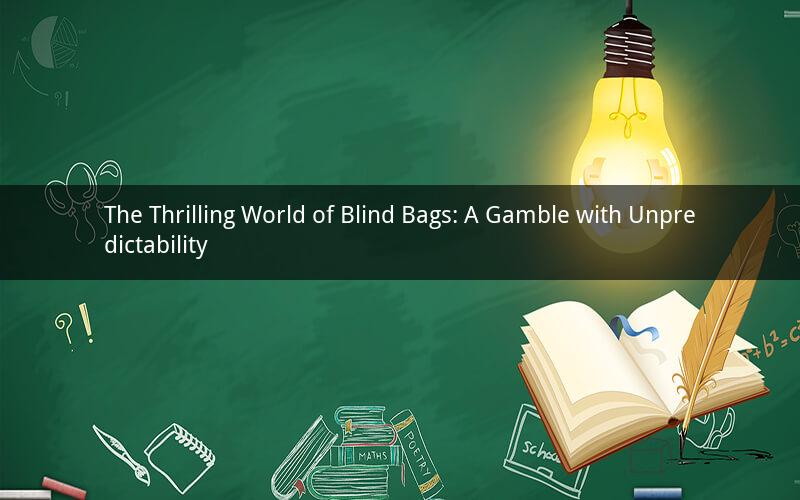
Blind bags have become a popular trend in the toy and collectible market. These mystery packages, filled with a random assortment of items, offer an element of excitement and unpredictability. However, many people question whether blind bags can be considered a form of gambling. In this article, we will delve into the concept of blind bags, analyze their similarities with gambling, and explore the ethical considerations surrounding this captivating phenomenon.
The Concept of Blind Bags
Blind bags are small, opaque containers that contain a variety of items. These items can range from toys, gadgets, and accessories to limited-edition collectibles. The allure of blind bags lies in the uncertainty of what one might find inside. When purchasing a blind bag, the buyer has no idea what is hidden within the packaging, making the experience thrilling and full of surprises.
The Thrill of the Unpredictable
One of the primary reasons why blind bags have gained immense popularity is the element of unpredictability they offer. The excitement of not knowing what lies ahead keeps enthusiasts coming back for more. This thrill is reminiscent of gambling, where the anticipation of winning something valuable creates a sense of anticipation and excitement.
Gambling: A Definition
To understand whether blind bags can be considered a form of gambling, it's essential to define what gambling is. Gambling involves risking something of value on an uncertain event with the hope of winning something else of value. It typically involves elements of chance and consideration, where participants place bets on the outcome of a game or event.
The Similarities Between Blind Bags and Gambling
1. Uncertainty: Both blind bags and gambling involve an element of uncertainty. In gambling, participants are unsure of the outcome of a game or event. Similarly, when purchasing a blind bag, the buyer has no idea what they will find inside.
2. Risk and Reward: In both situations, there is a risk involved. In gambling, participants risk their money in the hope of winning. In the case of blind bags, the risk is the cost of the bag itself, with the potential reward being a desirable item.
3. Consideration: Gambling requires consideration, which means that participants must provide something of value in exchange for a chance to win something else. In the case of blind bags, the consideration is the money spent on the bag itself.
4. Chance: Both blind bags and gambling rely on chance. The outcome of a game or event in gambling is based on luck, just as the contents of a blind bag are a result of random selection.
The Ethical Considerations
While there are similarities between blind bags and gambling, there are also ethical considerations to take into account. Some argue that blind bags can be addictive and encourage impulsive spending, particularly among children. Others believe that the thrill of the unknown can be a positive experience as long as it is done in moderation.
1. Addiction: There is a concern that the excitement of blind bags can lead to addiction, especially among younger individuals. It is essential for parents and guardians to monitor the amount of money their children spend on these mystery packages and promote responsible spending habits.
2. Impulsive Spending: Blind bags can encourage impulsive spending, as individuals may be driven by the desire to acquire rare or desirable items. This can lead to financial strain and unnecessary debt.
3. Promoting Responsible Behavior: To mitigate the negative aspects of blind bags, it is crucial to promote responsible behavior. This includes educating individuals about the importance of budgeting and setting limits on spending.
4. Balancing Thrill and Moderation: While the thrill of blind bags can be enjoyable, it is essential to maintain a balance between excitement and moderation. This means setting personal limits on spending and not allowing the allure of the unknown to take precedence over one's financial well-being.
Frequently Asked Questions
1. What is a blind bag?
A blind bag is a small, opaque container that contains a variety of items, ranging from toys to collectibles. The contents of the bag are unknown to the buyer until it is opened.
2. Can blind bags be considered a form of gambling?
Yes, blind bags can be considered a form of gambling due to the element of uncertainty, risk, reward, consideration, and chance involved.
3. Are blind bags addictive?
Blind bags can be addictive, as the excitement of the unknown can lead individuals to spend excessive amounts of money in pursuit of rare or desirable items.
4. How can I promote responsible spending on blind bags?
To promote responsible spending on blind bags, set personal limits on how much you are willing to spend and educate yourself about the products you are purchasing.
5. What are the ethical considerations surrounding blind bags?
The ethical considerations surrounding blind bags include the potential for addiction, impulsive spending, and the need to promote responsible behavior and moderation.
In conclusion, blind bags offer an exciting and unpredictable experience that resembles gambling in many aspects. While there are ethical considerations to take into account, it is essential to approach this phenomenon with moderation and responsibility. By setting personal limits and being aware of the potential risks, individuals can enjoy the thrill of blind bags without falling into the trap of addiction and excessive spending.